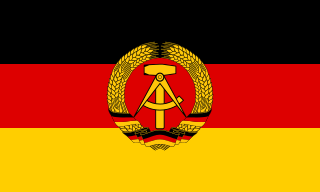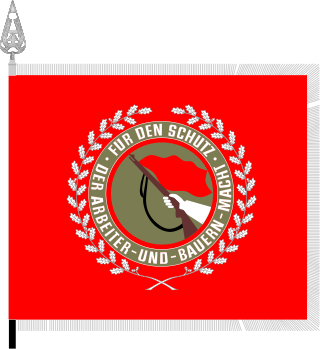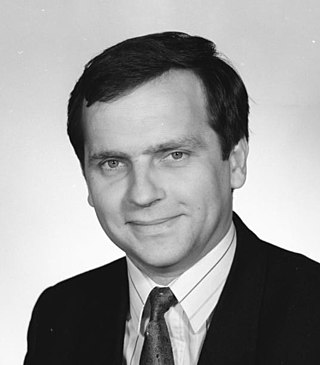Related Research Articles

East Germany,officially the German Democratic Republic,was a country in Central Europe that existed from its creation on 7 October 1949 until its dissolution on 3 October 1990. Until 1989,this country was commonly viewed as a communist state,it described itself as a socialist "workers' and peasants' state". Before the establishment,its territory was administered and occupied by Soviet forces with the autonomy of the native communists following the Berlin Declaration abolishing German sovereignty in World War II;when the Potsdam Agreement established the Soviet-occupied zone,bounded on the east by the Oder–Neisse line. GDR was dominated by the Socialist Unity Party of Germany (SED) from 1949 to 1989 before being liberalized under the impact of the Revolutions of 1989 against the communist states,helping East Germany be united with the West. Unlike West Germany,SED did not see its state as the successor one of the German Reich (1871-1945) and abolished the goal of unification in the constitution (1974). Under the SED rule,GDR was often judged as a Soviet satellite state,most scholars and academics described it as a totalitarian regime.
Lothar is a Danish,Finnish,German,Norwegian,and Swedish masculine given name,while Lotár is a Hungarian masculine given name. Both names are modern forms of the Germanic Chlothar. Notable people with this name include:

Wilhelm Frick was a prominent German politician of the Nazi Party (NSDAP),who served as Minister of the Interior in Adolf Hitler's cabinet from 1933 to 1943 and as the last governor of the Protectorate of Bohemia and Moravia.

Gregor Florian Gysi is a German attorney,former president of the Party of the European Left and a prominent politician of The Left political party.

Hans Modrow was a German politician best known as the last communist premier of East Germany.

Wilhelm Stoph was a German politician. He served as Chairman of the Council of Ministers of the German Democratic Republic from 1964 to 1973,and again from 1976 until 1989. He also served as chairman of the State Council from 1973 to 1976.

Lothar de Maizière is a German Christian Democratic politician. In 1990,he served as the only premier of the German Democratic Republic to be democratically elected freely and fairly by the people. He was also the last leader of an independent East Germany.

The Combat Groups of the Working Class was a paramilitary organization in the German Democratic Republic (GDR) from 1953 to 1989.

The Deutsche Volkspolizei,commonly known as the Volkspolizei or VoPo,was the national police force of the German Democratic Republic from 1945 to 1990. The Volkspolizei was a highly-centralized agency responsible for most civilian law enforcement in East Germany,maintaining 257,500 personnel at its peak.

Karl Ernst Thomas de Maizière is a German politician of the Christian Democratic Union (CDU) who served as Federal Minister of the Interior from 2009 to 2011 and 2013 to 2018,as well as Federal Minister of Defence from 2011 to 2013. He previously served as Head of the Chancellery and Federal Minister for Special Affairs in the First Merkel cabinet from 2005 to 2009. Since 2009,he has been a member of the Bundestag for Meißen.
The Council of Ministers was the cabinet and executive branch of the German Democratic Republic from November 1950 until the country was reunified on 3 October 1990. Originally formed as a body of 18 members,by 1989 the council consisted of 44 members.
The Kasernierte Volkspolizei was the precursor to the National People's Army (NVA) in East Germany. Their original headquarters was in Adlershof locality in Berlin,and from 1954 in Strausberg in modern-day Brandenburg.

The Alexanderplatz demonstration was a demonstration for political reforms and against the government of the German Democratic Republic on Alexanderplatz in East Berlin on Saturday 4 November 1989. With between half a million and a million protesters it was one of the largest demonstrations in East German history and a milestone of the peaceful revolution that led to the fall of the Berlin Wall and German reunification. The demonstration was organized by actors and employees of theaters in East Berlin. It was the first demonstration in East German history that was organized by private individuals and was permitted to take place by the authorities. The speakers during the demonstration were members of the opposition,representatives of the regime and artists,and included the dissidents Marianne Birthler and Jens Reich,the writer Stefan Heym,the actor Ulrich Mühe,the former head of the East German foreign intelligence service Markus Wolf and Politburo member Günter Schabowski.

The Volkspolizei served as the armed forces and the national police of the German Democratic Republic from 1946 to 1956. The Volkspolizei was responsible for most law enforcement in East Germany,but because of its organisation and structure it was also considered a paramilitary force. Unlike police forces in most countries,they were equipped with armored personnel carriers and artillery and trained as military units.
Uta Nickel is a German economist and one of the former finance ministers of East Germany.

Günther Krause is a German engineer,academic,politician and businessman. After the Peaceful Revolution,he entered politics,serving in the Volkskammer and as a senior adviser to Minister-President Lothar de Maizière. In that role,he was a co-signatory to the Unification Treaty. After German reunification,he was elected to the Bundestag and served in various roles in the Helmut Kohl government. He first served as minister for special affairs from 1990 to 1991 and then as minister of transport from 1991 to 1993. He resigned from the office due to numerous scandals. Legal problems and scandals followed after his career in politics,earning him the nickname Sause-Krause.

Karl Maron (1903–1975) was a German politician,who served as the interior minister of East Germany. He also assumed different posts in East Germany's government.
Friedrich Dickel was a German politician,who served as the interior minister of East Germany for nearly twenty-six years.

The Volkspolizei-Bereitschaften were paramilitary police units of the German Democratic Republic from 1955 to 1990. The VPB were barracked units of the Volkspolizei for riot control and counterinsurgency with regiment status,under control of the Ministry of the Interior and considered part of the armed forces,but were never part of the National People's Army or the Ministry of National Defence.

The Modrow government refers to the final socialist government of the German Democratic Republic (GDR),which was led by Socialist Unity Party (SED) official Hans Modrow from November 1989 until East Germany's first democratically elected government took power on 18 March 1990.
References
- 1 2 3 4 "Ahrendt, Lothar" (in German). Bundesstiftung Aufarbeitung.
- 1 2 3 Nancy Travis Wolfe (1992). Policing a Socialist Society: The German Democratic Republic. New York: Greenwood Press. ISBN 978-0-3132-6530-3.
- ↑ "East Germany Approves "Reform-minded" Cabinet". Times Daily. West Berlin. AP. 19 November 1989. Retrieved 12 September 2012.
- ↑ "Deutsche Volkspolizei". Axis History. Retrieved 5 September 2012.
- 1 2 "Das Ende der Volkspolizei – Chronologie des Zerfalls". CILIP (in German). 27 December 1990. Retrieved 23 January 2022.
- ↑ "E. German Reveals Secret-Police Levels -- 1 In 80 Worked for or Aided Stasi". The Seattle Times. East Berlin. AP. 16 January 1990. Retrieved 5 September 2012.
- ↑ "Karriere für Alt-Kader". Der Spiegel (in German). 19 August 1990. Retrieved 14 March 2022.